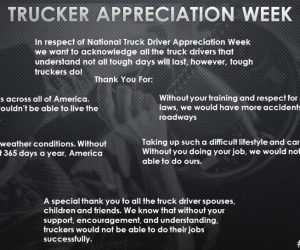Often, we talk about the importance of how keeping our body healthy results in a better work performance. The Federal Motor Carrier Safety Administration (FMCSA) sets medical standards the majority of U.S. drivers are required to meet.

Commercial truck drivers who haul a maximum vehicle weight of over 10,000 pounds must have a Medical Examiner’s (ME) Certificate. Also, commercial drivers that require a CDL have two more requirements. As of January 2014, CDL holders must inform to the State Driver Licensing Agency (SDLA) that they are operating or going to operate in one of the four categories within their CDL. This is referred to as self-certification.
ME Certificate
All CDL holders must have their ME certificates available to the SDLA. If a CDL holder is found to be driving in a category in which they are not self-certified, this can result in suspension of their commercial driving privileges. Those who do not update their ME Certificate with the state in which they reside can have their commercial driving privileges downgraded and will not be able to drive a motor vehicle, which requires a CDL.
What to expect during your medical screening
You should get regular medical screenings and visit your general MD frequently. Landstar requires good physical health, and it is also required apart from other qualifications. For additional resources regarding FMCSA regulations, visit their website at http://www.fmcsa.dot.gov/. The following are basic items you can expect at a medical screening and those that you should speak to your physician about.
- Vision
- Hearing
- Blood Pressure Cardiovascular
- Respiratory
- Neurological
- Musculoskeletal
- Diabetes Mellitus
- Psychological
- Drug and Alcohol Abuse
- Medications That Can Affect Driving
Physical qualifications
According to the FMCSA, a driver is considered qualified to operate a commercial vehicle if they
- Do not have any arm, hand, foot, or leg loss – unless a skill performance evaluation certificate has been given.
- Do not have any issues grasping with hand or fingers or issues with arm, feet, or legs that could interfere with operating a truck.
- They have no medical history or diagnosis of diabetes mellitus that requires them to take insulin.
- Have no current diagnosis of myocardial infarction, angina pectoris, thrombosis, coronary insufficiency, or other cardiovascular diseases.
- Have no medical history or diagnosis of high blood pressure that could interfere with the driver’s ability to operate a motor vehicle safely.
- Have no medical history or diagnosis of epilepsy or a condition that could cause the driver to lose consciousness or lose control of a vehicle.
- They have no mental, organic, nervous, or functional disease or psychiatric disorder that could interfere with their ability to operate a vehicle.
- Have no clinical diagnosis of alcoholism.
- Do not use Schedule I drugs such as narcotics, amphetamines, or any other habit-forming drugs.
Healthy medical screenings can help in staying compliant with the FMCSA standards. A medical examination is not a replacement for a visit to your doctor. Be sure to keep these medical screenings and medical cards up-to-date.



 The transportation industry is America’s lifeblood, by carrying vital food and supplies across the country. ...
The transportation industry is America’s lifeblood, by carrying vital food and supplies across the country. ...

